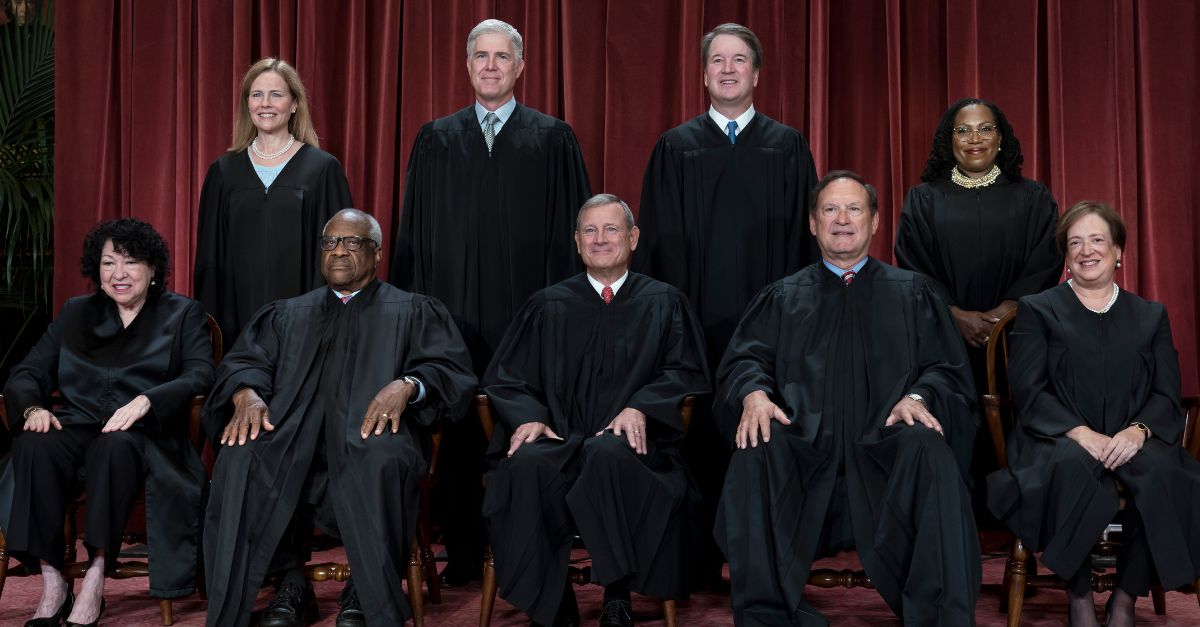
Members of the Supreme Court sit for a new group portrait following the addition of Associate Justice Ketanji Brown Jackson, at the Supreme Court building in Washington, Friday, Oct. 7, 2022. Bottom row, from left, Associate Justice Sonia Sotomayor, Associate Justice Clarence Thomas, Chief Justice of the United States John Roberts, Associate Justice Samuel Alito, and Associate Justice Elena Kagan. Top row, from left, Associate Justice Amy Coney Barrett, Associate Justice Neil Gorsuch, Associate Justice Brett Kavanaugh, and Associate Justice Ketanji Brown Jackson. (AP Photo/J. Scott Applewhite)
The Supreme Court agreed Friday to take up an appeal by a group of Maryland parents who oppose including LGBTQ-inclusive books in elementary school curriculum.
Montgomery County, Maryland, is situated 30 miles north of Washington D.C., and has been recognized as the most religiously diverse county in the United States. In 2022, the district announced that changes would be made to the elementary school curriculum that included a new reading list of storybooks with young LGBTQ characters as part the district’s broader efforts to foster inclusion.
A group of six parents represented by the Becket Fund for Religious Liberty sued the Montgomery County school board for including the books featuring lesbian, gay, bisexual, transgender and queer characters to its pre-K through 12th grade language-arts curriculum on the grounds that the books presented views on gender and sexuality that conflicted with their religious beliefs.
According to the plaintiffs, some members of the school board thought the books were inappropriate, and while it “initially allowed parents to opt their kids out,” it eventually changed policy to one in which “parents would not even be notified when the storybooks were read.”
Although the district continued to allow opt-outs from sex education lessons in health class, parents who objected to the storybooks felt their “only choice was to send them to private school or to homeschool,” according to their filing.
Per the parents’ brief to the Supreme Court, the district’s policy drew immediate attention from parents:
Hundreds of parents — mostly Muslim and Eastern Orthodox — packed the Board’s summer meetings. Dozens testified that they had religious obligations not to subject their young children to instruction on gender and sexuality that conflicted with their religious beliefs. The parents emphasized how impressionable young children are and how they lack independent judgment to process such complex and sensitive issues. In response, Board members publicly accused 2 them of promoting “hate” and compared them to “white supremacists” and “xenophobes.”
In their filing, parents Tamer Mahmoud and Enas Barakat say that their Islamic faith teaches “Respect for ‘God’s wisdom in creation.”” That “includes a religious conviction that ‘gender’ cannot be unwoven from biological ‘sex’” without ‘rejecting the dignity and direction God bestowed on humanity from the start,’” the filing says.
Likewise, plaintiffs Chris Persak and Melissa Persak, who are Roman Catholic, say they believe that, “a person’s biological sex is a gift bestowed by God that is both unchanging and integral to that person’s being,” and that they have a “religious obligation” to teach their children about “immutable sexual differences between males and females, the biblical way to properly express romantic and sexual desires, and the role of parents to love one another unconditionally and sacrificially within the confines of biblical marriage.”
Petitioners Jeff Roman and Svitlana Roman are Roman Catholic and Ukrainian Orthodox, respectively, and are the parents of an elementary son. The couple says they have a religious obligation to help their son “accept [his] own body as it was created,” and that until puberty, “children ‘must never be disturbed by unnecessary information about sex,’” per Catholic guidelines.
Another one of the petitioners, Kids First, is an unincorporated association that encompasses “hundreds of parents of diverse faiths” who object to Montgomery County’s policy. One parent represented by Kids First is Grace Morrison, who has an adopted daughter from Ukraine who has Down syndrome and attention deficit disorder. Kids First says that the child’s disabilities impairs her ability to make independent judgments, and therefore she is “particularly impressionable” and must be “protected” from the curriculum presented in the schools.
According to the brief books in question include:
- Pride Puppy,” a picture book about a young child and their family celebrating Pride Day aimed at three and four year olds. According to the petitioners’ brief, “The book invites students to search for various images, including ‘underwear,’ ‘leather,’ ‘lip ring,’ ‘[drag] king’ and ‘[drag] queen,’ and ‘Marsha P. Johnson,’ a controversial LGBTQ activist and sex worker.”
- “Intersection Allies,” a K-5 picture book that discusses the meaning of “transgender” and “nonbinary,” and invites children to consider what pronouns fit them.
- “Love, Violet,” a K-5 book about a young girl who has romantic feelings for a female classmate.
- “Born Ready” an elementary-age true story about a Black transgender boy who shared his gender identity with those around him.
- “Jacob’s Room to Choose” a book about two transgender children and their support of gender-free bathrooms.
The plaintiff parents raised a Free Exercise claim, and lost their bid for preliminary injunction at both the district and circuit courts. They appealed to the Supreme Court and were granted certiorari on Friday.
“The School Board has pushed inappropriate gender indoctrination on our children instead of focusing on the fundamental areas of education that they need to thrive,” said Grace Morrison, board member of Kids First, in a statement. “I pray the Supreme Court will stop this injustice, allow parents to raise their children according to their faith, and restore common sense in Maryland once again.”
“Cramming down controversial gender ideology on three-year-olds without their parents’ permission is an affront to our nation’s traditions, parental rights, and basic human decency,” said Eric Baxter, senior counsel at Becket. “The Court must make clear: parents, not the state, should be the ones deciding how and when to introduce their children to sensitive issues about gender and sexuality.”
The district did not immediately respond to request for comment.
You can read the parents’ full brief here.









